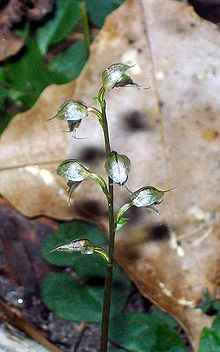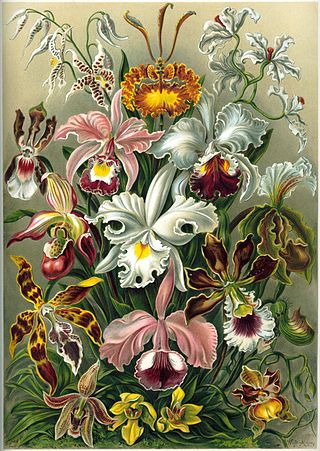
The taxonomy of the Orchidaceae (orchid family) has evolved slowly during the last 250 years, starting with Carl Linnaeus who in 1753 recognized eight genera. De Jussieu recognized the Orchidaceae as a separate family in his Genera Plantarum in 1789. Olof Swartz recognized 25 genera in 1800. Louis Claude Richard provided us in 1817 with the descriptive terminology of the orchids. (See External links below). The next step was taken in 1830-1840 by John Lindley, who recognized four subfamilies. He is generally recognized as the father of orchid taxonomy. The next important step was taken by George Bentham with a new classification, recognizing subtribes for the first time. This classification was first presented in a paper that Bentham read to the Royal Society in 1881. Then it was published in 1883 in the final volume of Genera Plantarum. The next great contributors were Pfitzer (1887), Schlechter (1926), Mansfeld (1937), Dressler and Dodson (1960), Garay (1960, 1972), Vermeulen (1966), again Dressler (1981). and Burns-Balogh and Funk (1986). Dressler's 1993 book had considerable influence on later work.

The Orchidoideae, or the orchidoid orchids, are a subfamily of the orchid family (Orchidaceae) that contains around 3630 species. Species typically have a single (monandrous), fertile anther which is erect and basitonic.

Rhizanthella, commonly known as underground orchids, is a genus of flowering plants in the orchid family, Orchidaceae and is endemic to Australia. All are leafless, living underground in symbiosis with mycorrhizal fungi. The inflorescence is a head of flowers held at, or just above the ground but mostly covered by soil or leaf litter and little is known about the mechanism of pollination.
Coilochilus is a genus of flowering plants in the orchid family, Orchidaceae. It contains only one known species, Coilochilus neocaledonicum, endemic to New Caledonia. Its closest relative is Cryptostylis, sole other genus of subtribe Cryptostylidinae.

Cryptostylis, commonly known as tongue orchids, is a genus of flowering plants from the orchid family. Tongue orchids are terrestrial herbs with one to a few stalked leaves at the base of the flowering stem, or leafless. One to a few dull coloured flowers are borne on an erect flowering stem. The most conspicuous part of the flower is the labellum, compared to the much reduced sepals and petals. At least some species are pollinated by wasps when they attempt to mate with the flower. There are about twenty five species found in South Asia, Southeast Asia and the South Pacific.

Diurideae is a tribe of orchid in the subfamily Orchidoideae. It contains about 40 accepted genera. As of April 2018, its division into subtribes remained unclear.

Drakaneinae is an orchid subtribe in the tribe Diurideae.
Cryptostylidinae is an orchid subtribe in the tribe Diurideae.
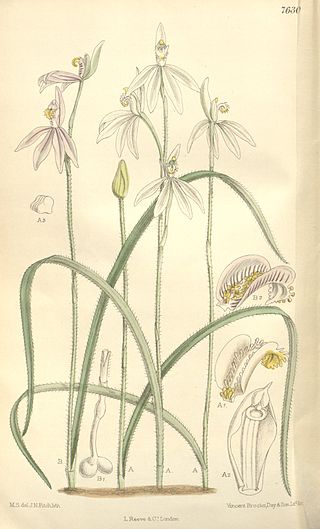
Caladeniinae is an orchid subtribe in the tribe Diurideae.

Megastylidinae is an orchid subtribe in the tribe Diurideae.

Prasophyllinae is an orchid subtribe in the tribe Diurideae.
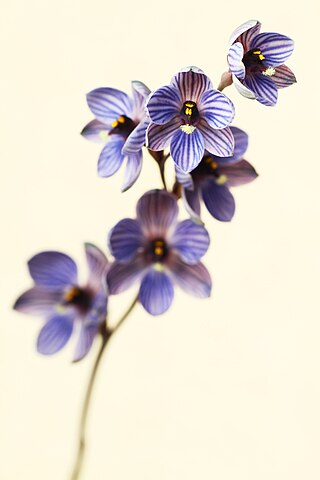
Thelymitrinae is an orchid subtribe in the tribe Diurideae.

Stigmatodactylus is a genus of flowering plants from the orchid family, Orchidaceae. It has thirteen currently recognized species, native to China, Taiwan, Japan, the Himalayas, the Philippines, Malaysia, Indonesia, New Guinea and the Solomon Islands.
Mark Alwin Clements (b. 1949) is an Australian botanist and orchidologist. He obtained his doctorate at the Australian National University defending his thesis entitled Reproductive Biology in relation to phylogeny of the Orchidaceae, especially the tribe Diurideae.

Carlos Adolfo Lehnebach is a New Zealand botanist. He is employed as a botany curator at the Museum of New Zealand Te Papa Tongarewa. Lehnebach has a master's degree and a PhD from Massey University.

Caleana dixonii, commonly known as the sandplain duck orchid is a rare species of orchid endemic to the south-west of Western Australia. It has a single smooth leaf and a single greenish yellow and fawn-coloured flower. It is distinguished by its flattened labellum with calli only near the tip of the labellum and its preference for growing on sandplains.
Corybas × miscellus, commonly known as the hybrid helmet orchid, is a hybrid species of terrestrial orchid endemic to South Australia and a very small area in far western Victoria. It has a heart-shaped to more or less round leaf and a single reddish purple flower with greyish translucent areas. It is a natural hybrid between C. diemenicus and C. incurvus and shares the characteristics of the parent species.
Caladenia rosea is a plant in the orchid family Orchidaceae and is endemic to relatively inaccessible, high lateritic plateaux in a high rainfall area in south-western Western Australia. It is a terrestrial orchid with a single hairy leaf and up to three pink flowers on a thin, sparsely-hairy stem. It is similar to Caladenia flava but is distinguished by the perianth being pink to dark pink with prominent red striping and spotting on the dorsal sepal and lateral petals. Caladenia rosea mimics Hypocalymma robustum (Myrtaceae) in terms of flowering time, colour and scent.
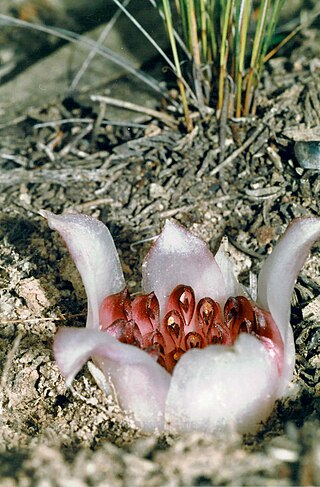
Rhizanthella johnstonii, commonly known as south coast underground orchid, is a species of flowering plant in the orchid family and is endemic to the southwest of Western Australia. It is a subterranean herb that has a horizontal rhizome and a head of up to sixty small white flowers with a pink tinge, surrounded by relatively large, cream-coloured to pale pinkish cream bracts.

Diuridinae is an orchid subtribe in the tribe Diurideae.
